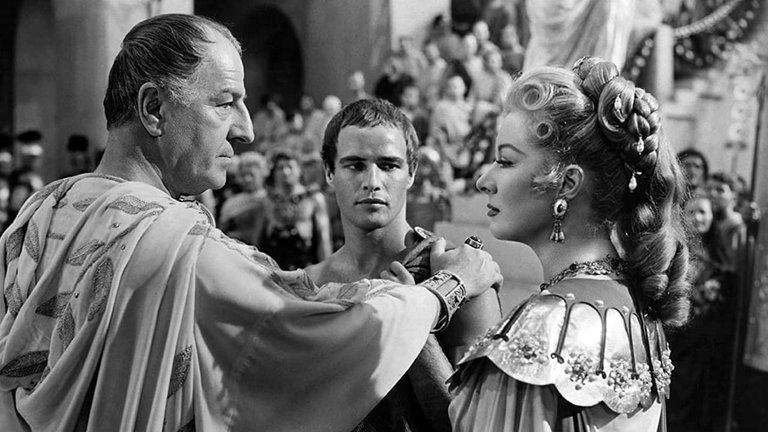Film Review: William Shakespeare's Julius Caesar (1953)

William Shakespeare is, among other things, known for plays about medieval history of his native England, but his historical plays also covered more distant past, including Classical period and the event which is considered the best known and arguably the most consequential assassination in history. The play, titled Julius Caesar, was in 1953 adapted for screen as Hollywood film written and directed by Joseph L. Mankiewicz.
The plot begins in Rome in March 44 BC. The Old Republic has suffered through the years of brutal civil war ultimately won by gifted general and popular statesman Julius Caesar (played by Louis Calhern). After his return to the city in triumph, many believe that Caesar, who had proclaimed himself as dictator for life, would formally take the crown as King. Although Caesar refuses to do so, this doesn’t sit well among senators like Cassius (played by John Gielgud) who believe that the Republic will be saved if Caesar is killed. Caesar’s friend Brutus (played by James Mason) reluctantly joins conspirators and take part in Caesar’s killing in the Senate. Assassins’ plans are, however, thwarted by Caesar’s loyal lieutenant Mark Anthony (played by Marlon Brando) whose rousing speech turns Roman masses against conspirators, now forced to flee for their lives. Anthony allies with Caesar’s nephew and heir Octavian (played by Douglas Watson) and two of them raise armies that would face Brutus and Cassius in the Battle of Philippi.
Main creative force behind the film was John Houseman, a renowned producer, known for his collaboration with young stage director Orson Welles in 1937 innovative Broadway retelling of Julius Caesar. By 1953 relations between Houseman and Welles have soured, and Houseman partly made the film in order to suppress Welles’ attempt to make his own film version with lower budget. In any case, Houseman was fortunate to leverage resources from MGM, the top Hollywood studio at the times, which included recycling props and sets from 1951 historic epic Quo Vadis. Director Mankiewicz reconstructed Ancient Rome with great skill, although he has given more focus to political drama than visual spectacle.
The main asset of the film is in the exceptional cast, with three actors particularly standing out in their respective roles. John Gielgud is effective as fanatical Cassius in his Hollywood debut, while James Mason shines as conspirator torn between friendship and patriotic duty, while Marlon Brando disarms all sceptics by elegantly playing his first and the only Shakespearean screen role. While the film excels in many aspects, it does suffer from an over-reliance on Shakespearean flowery dialogue that may feel unrealistic and dated to modern audiences. Additionally, female roles like Greer Garson as Calpurnia are underused, while Deborah Kerr as Brutus’ wife Portia doesn’t serve any sensible purposes. The Battle of Philippi scene, shot in a California canyon, looks more like a skirmish in a western film and lacks the grandeur expected of historic event that took hundreds of thousands of participants.
Another problem for Julius Caesar is that it is still product of its time. Houseman deliberately refused to make it in colour, claiming that the audience would relate better to its political themes and allegories to Fascism if it resembled black-and-white newsreels. Scene depicting Roman mobs lynching Cinna the Poet mistaking it for conspirators, taken from the play, was shot but later edited out of the film, with Houseman and MGM fearing that it could be interpreted as criticism of Red Scare and McCarthyst persecutions that were going on in America at the time.
Despite its flaws, Julius Caesar received positive reviews and performed well at the box office. It remains a notable cinematic adaptation of Shakespeare's work, although modern audiences might find HBO's Rome series to cover the same event more effectively. Mankiewicz later worked on Cleopatra, another production with thematic similarities but less success.
RATING: 6/10 (++)
Blog in Croatian https://draxblog.com
Blog in English https://draxreview.wordpress.com/
InLeo blog https://inleo.io/@drax.leo
Hiveonboard: https://hiveonboard.com?ref=drax
Rising Star game: https://www.risingstargame.com?referrer=drax
1Inch: https://1inch.exchange/#/r/0x83823d8CCB74F828148258BB4457642124b1328e
BTC donations: 1EWxiMiP6iiG9rger3NuUSd6HByaxQWafG
ETH donations: 0xB305F144323b99e6f8b1d66f5D7DE78B498C32A7
Posted using CineTV